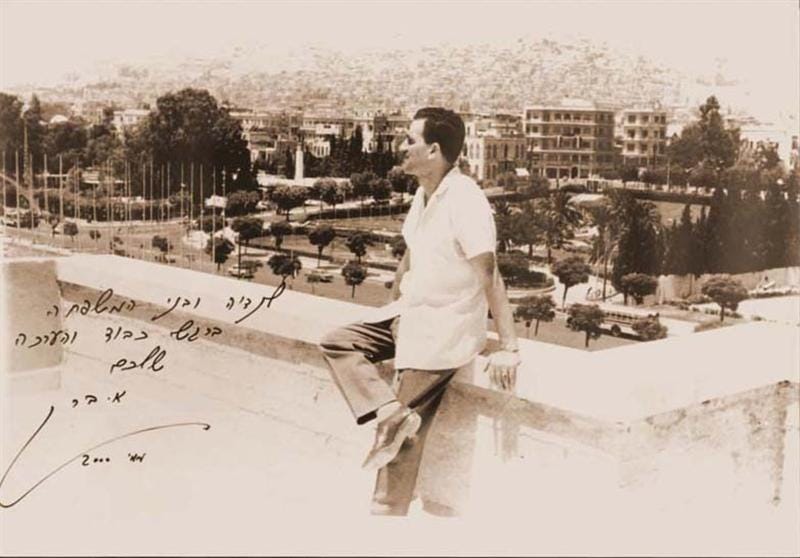10 Unbelievable Stories About Israel
The modern State of Israel is the story of real people who refuse to accept the limits of logic or the conventional wisdom that governs every other nation.
Please consider supporting our mission to help everyone better understand and become smarter about the Jewish world. A gift of any amount helps keep our platform free of advertising and accessible to all.
You can also listen to the podcast version of this essay on Apple Podcasts, Google Podcasts, and Spotify.
Israel’s history reads nothing like the tidy timelines taught in classrooms. It’s a whirlwind of impossible missions, outrageous gambles, secret operations disguised as vacation resorts, and split-second decisions that shaped the fate of a nation.
In a world that often reduces Israel to headlines and talking points, the truth is far stranger, bolder, and more unbelievable than most people realize. These are not myths, legends, or movie scripts; they are documented events, carried out by real people who refused to accept the limits of logic or the conventional wisdom that governs every other nation.
What follows is a tour through some of the wildest, craziest, most audacious true stories in Israeli history — moments when the margins between survival and annihilation were razor thin, and yet, somehow, the improbable became reality.
1. The Christmas Eve Boat Heist — Operation Noah’s Ark (1969)
Israel desperately needed missile boats for its navy. France agreed to sell them, then suddenly slapped on an arms embargo. But the boats were already built and sitting in a French port.
So the Israelis created a fake Norwegian company, fake executives, fake shipping papers, and whole fake commercial cover story. The French thought, “Oh good, the Norwegians bought them.”
On December 24th, when every official in France was home roasted on wine and holiday dinners, Israeli crews quietly boarded the boats, started the engines, and casually sailed them into the Mediterranean.
By the time anyone noticed, the boats were already halfway to Haifa. France was furious, but the deception was legal on paper. The world press called it “the greatest naval theft of the century.”
2. The Mossad’s Fake Sudanese Luxury Resort — Operation Brothers (1977–1984)
To smuggle thousands of Ethiopian Jews out of hostile territory, the Mossad’s idea was … run a resort. Seriously. They leased an abandoned diving hotel on the Red Sea, renovated it, created brochures, built a bar, offered windsurfing classes, and hired agents who could also mix decent cocktails.
Tourists loved it. Sudanese officials loved the tax revenue. The Mossad loved that no one suspected a thing.
By day, agents taught scuba and served drinks. By night, they drove covert convoys of Ethiopian Jews across the desert to aircraft that flew them to Israel.
One night, Sudanese soldiers stopped the agents. The Mossad officer bluffed:
“We’re rushing to fix a water pump at the resort.” They let him go.
The operation saved thousands.

3. The Kibbutz That Accidentally Became Part of the Nuclear Program (1950s–1960s)
Israel’s early nuclear efforts were so secretive that not even the people working on key logistics knew what they were supporting.
At Kibbutz Sdot Yam, members were told they were producing “ceramic materials” for export. In reality, they were manufacturing crucial components for the Dimona nuclear reactor.
Workers later said they assumed the crates contained pottery or industrial supplies. Only decades later did they learn the truth: They were part of Israel’s most strategic and secretive program.
Imagine milking cows all morning and then unknowingly packing parts for a nuclear facility in the afternoon. Only in Israel.
4. The Time Israel Hijacked Its Own Plane as a Security Test (1954)
In the early years of aviation, Israel wanted to test how crews would respond to a hijacking, but they didn’t warn the passengers. Agents pretending to be terrorists “took over” the flight midair. The pilot complied. Passengers panicked. Some tried to rush the cockpit.
The incident was so chaotic that afterward Israel created strict rules: Never run simulations on unsuspecting civilians again.
This event became a cornerstone of Israel’s philosophy: Security must be real, rigorous, and never improvised.
5. The Night Ben-Gurion Changed Israel’s Time Zone to Win a Battle (1948)
During the siege of Jerusalem, different units and militias used different clocks — some on “Jewish time,” some on “British time,” some on “Arab time.” Coordinating an attack was impossible.
Ben-Gurion’s solution? He declared a temporary national time zone, ordering everyone to synchronize their watches to a new official hour, just for that night.
It worked. The coordinated attack broke the Arab siege line and opened the road to Jerusalem. This might be the only case in history where winning a battle required … resetting a country’s clocks.
6. Israel’s First Air Force: Junky Planes, Rogue Pilots, and Pure Desperation (1948)
The fledgling state had no real air force. The U.S. banned exporting weapons. Britain blocked everything. So what did Israel do?
They bought broken-down Czech Messerschmitt knockoffs, smuggled American World War II pilots through Europe, and assembled aircraft in barns. One pilot flew into battle while physically holding his cockpit door closed because it wouldn’t latch. Another said the plane shook so violently he lost fillings.
Yet these pilots stopped the Egyptian army long enough for Israeli forces to reorganize. In military history, it was considered impossible. Israel did it in its first week of existence.
7. Operation Diamond: Stealing the Soviet Union’s Most Advanced Jet (1966)
The MiG-21 was the pride of Soviet aviation and the backbone of Arab air forces. Israel wanted one for study. The CIA wanted one even more.
So Israel identified an Iraqi Christian pilot, Munir Redfa, who felt discriminated against. They built trust with him over months. Promises included safety for his family, a new life in Israel, a large sum of money, and a career after defection
Redfa flew the jet low over the desert — and straight into Israel. When the CIA arrived and saw it, eyewitnesses said American analysts literally touched it like it was the Holy Grail. It changed the balance of air power in the Middle East.
Israel later used its insights to dominate the skies in the 1967 Six-Day War.
8. The Spy Who Climbed to the Top of Syria’s Leadership (1960–1965)
Eli Cohen’s undercover life in Damascus is one of the most extraordinary spy stories in world history. He hosted lavish parties. Syrian generals spilled secrets after drinks. He became close friends with the defense minister. He nearly became Deputy Minister of Defense.
His most famous act of influence: He convinced Syrian officials to plant eucalyptus trees around their Golan Heights fortifications to “provide shade for soldiers.” Israel later used those rows of trees as targeting markers in the 1967 Six-Day War.
Cohen was eventually caught, but his intelligence shaped Israel’s survival.
9. The Ayatollah’s Rolodex (1979)
During the Iranian Revolution, Israeli diplomats had hours to evacuate. But before leaving, Mossad and embassy staff broke open safes, removed decades of secret intel, shredded sensitive documents, and hid other materials inside innocuous-looking mail bags.
They even took the new regime’s communications codes and key documents belonging to Ayatollah Khomeini’s fledgling government. All of it was mailed back to Israel disguised as regular embassy correspondence. When the Revolutionary Guard took over the premises, the safes were empty.
One Iranian officer reportedly said: “The Israelis stole the building from us.”
10. Refusing to Accept the Impossible
The story sounds fictional, like something from an Aaron Sorkin political thriller. But it actually happened, and it changed the balance of power in the Middle East forever.
One of Shimon Peres’ first and most significant tasks (as a 29-year-old Director General of Israel’s Ministry of Defense) was to help engineer and implement the Sinai-Suez campaign, among the most daring and unlikely military triumphs of the post-World War II era. It was 1956 and as the campaign unfolded, Peres had something of an epiphany.
At a villa in France, where Israeli, British, and French officials had gathered to finalize planning for the campaign, Peres approached the French foreign and defense ministers and made a proposal everyone knew would be rejected out of hand. To everyone’s surprise (including his) the French officials agreed: France would help Israel establish its own nuclear-energy program.
In September 1957, Israel was set to sign an agreement with France. The French Atomic Energy Commission, after four years of negotiations, had agreed to provide Israel with a plutonium reactor. All that was needed in order to cement the deal was the signature of the French foreign minister and his prime minister.
Peres’ first stop on Monday morning, September 30th, was at the office of Pierre Guillaumat, the head of France’s Atomic Energy Commission and an avid supporter of Israel. He told Peres what he already knew: The deal could only be finalized with the French government’s approval, and their government was teetering on the edge of collapse.
Peres hurried to the office of Foreign Minister Christian Pineau, the deal’s main opponent, and Pineau promptly told Peres that he wanted to help but couldn’t. The Americans would be livid if they found out and might impose sanctions on France, which would cripple its own dawning nuclear capacity. Moreover, the agreement could induce the Soviet Union to arm Egypt with nuclear weapons.
But Peres had come prepared. The reactor was for peaceful purposes, he said. If that ever was to change, Israel would consult with France first. Also, he said, who was to say the Soviet Union wouldn’t introduce nuclear weapons to Egypt on its own accord? Then what would the West do?
Pineau agreed, and Peres urged him to call the prime minister. Maurice Bourgès-Maunoury did not answer, so Peres convinced Pineau to dictate the terms of their agreement to his secretary. The two of them signed the paper, and then Peres convinced him that he, a foreign national, would ferry the paper to the prime minister of France.
All that was needed now was Bourgès-Maunoury’s signature. Peres went to his office and waited. The hours passed. Afternoon became evening. Several rounds of whiskey were sent to the office. And, as midnight approached, Peres had two realizations: He would not see the prime minister that evening, and the prime minister, who was stuck in parliament, was likely being defeated in a no-confidence vote.
The next morning, Israeli Prime Minister David Ben-Gurion wrote in his diary that the French government had fallen over a vote about Algeria, and that Peres’ trip to Paris was likely “for naught.”
He did not know that Peres had secured the prime minister’s oral agreement late that night and that, at nine in the morning, Peres was seated in Bourgès-Maunoury’s office. The French prime minister had not slept, and his eyes were red, since he was no longer the prime minister of France. He had no authority to sign an agreement on behalf of the Fourth Republic. But with Peres’ encouragement, he signed his consent, authorizing the agreement on a piece of paper that held the previous day’s date.
And in that way the seed of Israel’s nuclear-energy program was planted.
Peres said, summing up the backroom drama: “This date or that, what does it matter? Of what significance is that between friends?” Legendary Israeli Defense Minister Moshe Dayan later added: “The reactor was built because Shimon Peres simply refused to accept the word impossible.”





What a list of inspired and miraculous stories . Long live Israel.
And that’s awesome 💪🇮🇱